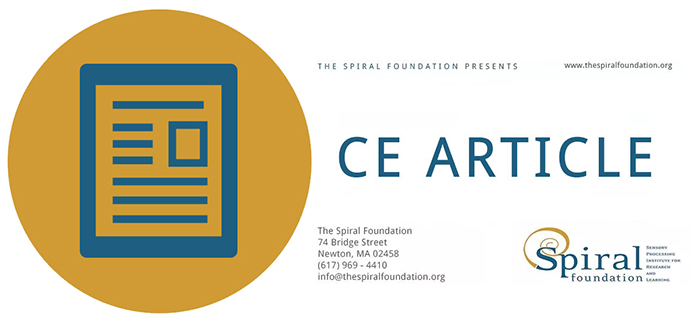Written by: Teresa May-Benson, ScD, OTR/L, FAOTA
originally published July 1, 2019
Self-Study Articles are eight to twelve page scholarly articles on current topics related to sensory integration and sensory processing disorder.
Description: Children with sensory processing challenges often have behavioral and emotional responses that are seemingly out of proportion with the tasks and demands at hand. These inappropriate responses are some of the top concerns among parents of children with sensory processing difficulties. Connections between sensory modulation and behavioral and emotional regulation are well documented, however, there are other areas of function that also impact regulation that are less well understood. This article explores the relationship between praxis skills and behavioral and emotional regulation with the intent of supporting occupational therapy practitioners in identifying and addressing these challenges.
Learning Objectives
By the end of this article readers will be able to:
- Describe the relationship between motor planning and various aspects of behavioral regulation.
- Identify the relationship of motor planning to functional competencies in school, activities and social areas.
- Describe the types of behavioral regulation challenges observed in varying patterns of praxis dysfunction.
Course Level: Introductory. There are no prerequisites for this course.
Suitable For: Occupational therapists, OT assistants
AOTA
Domain: Areas of Occupation
Process: Intervention
Contact Hours: This course is worth 1.0 contact hours or 0.1 AOTA CEUs.
Completion Requirements: To receive contact hours for this course you must read the article in its entirety, and complete the accompanying assessment.
ADA/Section 504: If you require special accommodations, please contact the Spiral Foundation at admin@thespiralfoundation.org or (617) 969 – 4410 ext. 231.
Continuing Education:

Occupational Therapy Practitioners/ Occupational Therapy Assistants: The Spiral Foundation is an Approved Provider of Continuing Education for occupational therapists and occupational therapy assistants by the American Occupational Therapy Association. The assignment of AOTA CEUs does not imply endorsement of specific course content, products, or clinical procedures by AOTA.

